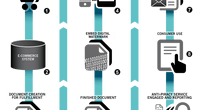
The Philippines has become rather serious at combating book piracy in schools and on the consumer level. They are doing this to attract major publishers from Europe and the United States.
US based publishers have been unable to market their textbooks and print books to the Philippines because of sanctions imposed by the United States Trade Representatives 301 Report. This report basically establishes trade barriers due to flagrant abuses of intellectual property laws, such as copyright, patents and trademarks.
For the first time in twenty years due to anti-piracy measures being employed by the Intellectual Property Office and the National Book Development Board the Philippines has been removed from the 301 list.
The Philippines’ removal in the watch list does not mean it has eradicated book piracy. IP Philippines and its partners in government and in the private sector must continue to set-up effective mechanisms to protect IPRs including combating book piracy.
There are some big challenges in removing piracy altogether because there is a general acceptance. Organized crime are photocopying and scanning whole textbooks and selling them directly to schools, colleges and universities. These intuitions are aware that not all the textbooks they buy are genuine, but it is hard to tell the difference.
Michael Kozlowski is the editor-in-chief at Good e-Reader and has written about audiobooks and e-readers for the past fifteen years. Newspapers and websites such as the CBC, CNET, Engadget, Huffington Post and the New York Times have picked up his articles. He Lives in Vancouver, British Columbia, Canada.
